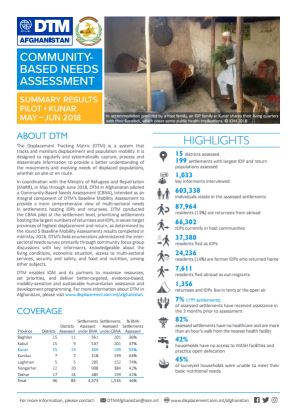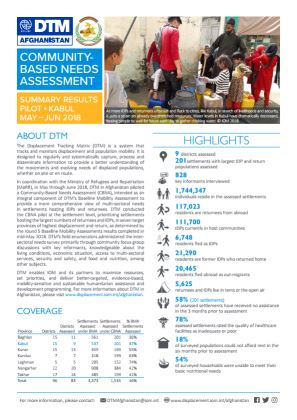-
Countries
-
Data and Analysis
-
Special Focus
-
Crisis Responses
Return migration

Contact
DTMAfghanistan@iom.int
Language
English
Location
Afghanistan
Period Covered
May 01 2018
Jun 30 2019
Activity
- Mobility Tracking
- Site Assessment
In coordination with the Ministry of Refugees and Repatriation (MoRR), in May through June 2018, DTM in Afghanistan piloted a Community-Based Needs Assessment (CBNA), intended as an integral component of DTM's Baseline Mobility Assessment to provide a more comprehensive view of multi-sectoral needs in settlements hosting IDPs and returnees.
In Kunduz, 36.3% of surveyed households were unable to meet their basic nutritional needs. The main reason that prevented households from meeting their nutritional needs was the high cost of food and food shortages due to environmental reasons.

Contact
DTMAfghanistan@iom.int
Language
English
Location
Afghanistan
Period Covered
May 01 2018
Jun 30 2018
Activity
- Mobility Tracking
- Site Assessment
In coordination with the Ministry of Refugees and Repatriation (MoRR), in May through June 2018, DTM in Afghanistan piloted a Community-Based Needs Assessment (CBNA), intended as an integral component of DTM's Baseline Mobility Assessment to provide a more comprehensive view of multi-sectoral needs in settlements hosting IDPs and returnees.
The unemployment rate for men in Kunar is 79%, the highest reported across the seven assessed pilot provinces. Female participation in employment was also low, 97% of women were reportedly unemployed. The high rates of unemployment correlate with the barriers to employment in Kunar, as respondents ranked lack of economic opportunities, including for women, as the most significant barrier, followed by lack of vocational training or further education, and insecurity. The average percentage of children (3%) and the elderly (4%) contributing to household incomes was also low.

Contact
DTMAfghanistan@iom.int
Language
English
Location
Afghanistan
Period Covered
May 01 2018
Jun 30 2018
Activity
- Mobility Tracking
- Site Assessment
In coordination with the Ministry of Refugees and Repatriation (MoRR), in May through June 2018, DTM in Afghanistan piloted a Community-Based Needs Assessment (CBNA), intended as an integral component of DTM's Baseline Mobility Assessment to provide a more comprehensive view of multi-sectoral needs in settlements hosting IDPs and returnees.
The unemployment rate for men in Kabul was 59%, however, Deh Sabz district reported the highest rate of unemployment (79%). Female participation in employment was comparatively higher in Kabul than the other provinces, as 18% of women were in either partial or full employment. Kabul district reported the highest rate of women in full or partial employment (35%).

Contact
DTMAfghanistan@iom.int
Language
English
Location
Afghanistan
Period Covered
May 01 2018
Jun 30 2018
Activity
- Mobility Tracking
- Site Assessment
In coordination with the Ministry of Refugees and Repatriation (MoRR), in May through June 2018, DTM in Afghanistan piloted a Community-Based Needs Assessment (CBNA), intended as an integral component of DTM's Baseline Mobility Assessment to provide a more comprehensive view of multi-sectoral needs in settlements hosting IDPs and returnees.
Of the seven provinces, Baghlan received only 7% of total assistance. Of all the assistance delivered in Baghlan, WASH received 32%, livelihood support received 32%, education received 20.7% and food received 8.3%. No assistance was received for health and shelter.

Contact
DTMAfghanistan@iom.int
Language
English
Location
Afghanistan
Period Covered
May 01 2018
Jun 30 2018
Activity
- Mobility Tracking
- Site Assessment
In coordination with the Ministry of Refugees and Repatriation (MoRR), in May through June 2018, DTM in Afghanistan piloted a Community-Based Needs Assessment (CBNA), intended as an integral component of DTM's Baseline Mobility Assessment to provide a more comprehensive view of multi-sectoral needs in settlements hosting IDPs and returnees.
In Takhar, 28.7% of surveyed households were unable to meet the basic nutritional needs. The main reason that prevented households from meeting their basic nutritional needs was the high cost of food and food shortages due to environmental reasons.

Contact
DTMAfghanistan@iom.int
Language
English
Location
Afghanistan
Period Covered
May 01 2018
Jun 30 2018
Activity
- Mobility Tracking
- Site Assessment
In coordination with the Ministry of Refugees and Repatriation (MoRR), in May through June 2018, DTM in Afghanistan piloted a Community-Based Needs Assessment (CBNA), intended as an integral component of DTM's Baseline Mobility Assessment to provide a more comprehensive view of multi-sectoral needs in settlements hosting IDPs and returnees. DTM conducted the CBNA pilot at the settlement level, prioritizing settlements hosting the largest numbers of returnees and IDPs, in seven target provinces of highest displacement and return, as determined by the round 5 Baseline Mobility Assessments results completed in mid-May 2018.
Pagination
- Previous page
- Page 46
